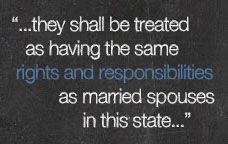



Same-Sex Marriage Laws in Washington
Couples in same-sex and opposite-sex couples are often equally unsure of what legal rights and responsibilities are involved in marriage. The Revised Code of Washington (RCW) is where Washington’s statutes are provided. Specifically, Chapter 26 contains the portions related to marriage, dissolution, and parenting.
Provided below are some of the laws that relate specifically to the expansion of the definition of marriage to include same-sex couples, and some of the statutes that provide information on some of the most important rights and responsibilities connected to marriage.
RCW 26.04.010. Marriage contract — Void marriages — Construction of gender specific terms — Recognition of solemnization of marriage not required
 This statute was modified to provide that marriage is between two people,
instead of requiring a man and a woman. RCW 26.04.010 also requires that
statutes relating to the rights and responsibilities of spouses including
gender specific terms must be read as gender neutral.
This statute was modified to provide that marriage is between two people,
instead of requiring a man and a woman. RCW 26.04.010 also requires that
statutes relating to the rights and responsibilities of spouses including
gender specific terms must be read as gender neutral.
This statute also provides that if a religious official declines to marry a couple or if a religious organization does not want to allow same-sex couples to use their services, facilities, etc., they will not be penalized.
RCW 26.04.020. Prohibited marriages.
This statute describes marriages that are prohibited in Washington. This includes marriages where either party is married or in a registered domestic partnership with another person. However, the law provides that a person may choose to marry their domestic partner. If you are considering marriage, it is important that you ensure that any prior marriage or domestic partnership with anyone else has been legally terminated.
RCW 26.04.260. Recognition of a legal union

Washington will recognize the legal relationship established in another state, whether marriage, domestic partnership, or civil union if it provides substantially the same rights, benefits, and responsibilities as Washington marriage.
However, subsection (b) of this statute requires that if parties to a civil union or domestic partnership become permanent residents of Washington, they must enter into marriage within one year of becoming permanent residents to preserve their recognition and treatment under the law.
This is concerning because many couples assume that their domestic partnership or civil union is automatically recognized as a marriage, and may not go through the additional step of getting married when they move to Washington.
It is unclear how this provision will be interpreted by the courts, but it could have an impact on the ability of divorcing couples to divide property and be awarded maintenance if they divorce more than a year after moving to Washington and never got married in Washington.
RCW 26.16. Rights and Liabilities — Community Property
Chapter 26.16 provides numerous statutes relating to how property may be used, held, and transferred during marriage, as well as how it should be divided upon dissolution. The rules are the same for same-sex and opposite-sex couples. For more information, see our guide on the division of property.
Property owned before marriage will be characterized as separate property, unless it is “comingled” with community property. Comingling of property occurs when the separate property can no longer be clearly traced by to its separate source, such as when money accumulated before marriage is deposited into a joint account along with community funds and thereafter community expenses are paid from the account.
Property acquired during the marriage is presumed to be community property. “Property” includes more than just money or tangibles; it includes wages, retirement accounts, and more.
There are some types of property that will be characterized as separate no matter when it is acquired. This includes property received as a gift, inheritance or bequest. The way a piece of property is characterized does not always determine whom it will be awarded to upon dissolution of the marriage.
RCW 26.26. Uniform Parentage Act
Chapter 26.26 provides some of the rights and responsibilities of parents. It is important to note that these provisions now apply to both same-sex and opposite-sex relationships.
RCW 26.26.116 provides that children born or a State Registered Domestic Partnership or marriage are presumed to be the child of both parents. RCW 26.26.116(1). In addition to the marital presumption, RCW 26.26.116 provides that an individual is presumed to be the parent of a child if, for the first two years of the child's life, the person resided in the same household with the child and openly held out the child as his or her own. RCW 26.26.116(2).
These presumptions may be rebutted. If you are a non-biological/non-adoptive parent concerned about protecting your relationship with your children, it is important that you speak with a family law attorney about the best way to protect your right to parent your child.
RCW 26.09.187. Criteria for establishing permanent parenting plan
For residential time, the statute outlines the following:
(3) RESIDENTIAL PROVISIONS.
-
The court shall make residential provisions for each child which encourage
each parent to maintain a loving, stable, and nurturing relationship with
the child, consistent with the child’s developmental level and the
family’s social and economic circumstances. The child’s residential
schedule shall be consistent with RCW
26.09.191. Where the limitations of RCW
26.09.191 are not dispositive of the child’s residential schedule, the court
shall consider the following factors:
- The relative strength, nature, and stability of the child’s relationship with each parent;
- The agreements of the parties, provided they were entered into knowingly and voluntarily;
- Each parent’s past and potential for future performance of parenting functions as defined in *RCW 26.09.004(3), including whether a parent has taken greater responsibility for performing parenting functions relating to the daily needs of the child;
- The emotional needs and developmental level of the child;
- The child’s relationship with siblings and with other significant adults, as well as the child’s involvement with his or her physical surroundings, school, or other significant activities;
- The wishes of the parents and the wishes of a child who is sufficiently mature to express reasoned and independent preferences as to his or her residential schedule; and
- Each parent’s employment schedule, and shall make accommodations consistent with those schedules.
Factor (i) shall be given the greatest weight.
Establishing parenting plans between same-sex couples is the same as that for opposite-sex couples. Courts cannot consider sexual orientation or gender identity as a factor in determining residential time with children.
There are two court cases that address these specific issues:
- In re Marriage of Cabalquinto, 100 Wn.2d 325, 669 P.2d 886 (1983) (Homosexuality is not a valid factor in parenting plans,)
- In re Marriage of Magnuson, 141 Wash.App. 347, 170 P.3d 65 (2007) (Transgender identity is not a valid factor in the context of residential placement/parenting plans.)
Together, these court cases make it clear that sexual orientation and gender identity cannot be used as factors for limiting residential time with a child. Residential time will be based on the best interest of the child after considering the factors outlined above.

-
 Best Law Firms
Best Law Firms -
 Best Lawyers
Best Lawyers -
 Super Lawyers
Super Lawyers -
 AV Preeminent
AV Preeminent -
 Avvo 10.0 Superb Family Law
Avvo 10.0 Superb Family Law -
 AAML
AAML -
 Washington's Best Places to Work
Washington's Best Places to Work -
 Best Lawyers
Best Lawyers

Client testimonials
-
"I knew I had a great team looking out for my best interest."My daughter is the sunshine of my life. I felt despair and a sense of helplessness on the day I was served. On the first appointment day when I arrived at the office and sat down with my lawyer, I knew I had made the right decision. From the beginning of my case to conclusion, I knew I had a great team looking out for my best interest (and the best interest of my child). Thank you McKinley Irvin!- Christine P.
-
"Thanks for all the work for our family over the past year."Thanks for all the work for our family over the past year. We’re really glad you are on our side.- P.O.
-
"I always felt my specific needs were very well represented and that I could count on David to be a trusted adviser."David remained very level headed and family focused throughout our proceedings. That said, I always felt my specific needs were very well represented and that I could count on David to be a trusted adviser during an otherwise difficult time.- T.M.
-
"We would highly recommend the knowledgeable and dedicated law firm of McKinley Irvin to anyone who might be seeking legal services."In our search for a reputable law firm to handle my sister’s divorce case, we explored our options until we found the McKinley Irvin law firm. McKinley Irvin has, through our experience, proven to be compassionate, understanding and patient during the long term process of my sister’s case. Due to her disabilities she needed more than the legalities and McKinley Irvin was able to provide their knowledge as well as the assurance to my sister that her case would be handled in her best interest. We cannot begin to express our gratitude for all that the McKinley Irvin law firm has done for us. We would highly recommend the knowledgeable and dedicated law firm of McKinley Irvin to anyone who might be seeking legal services.- P.M.
-
"I cannot imagine two people better able to represent me."Without David and Sam, there is no way I could have made it through this exceptionally difficult time in my life. I cannot imagine two people better able to represent me, nor a better firm to handle my affairs. You all have been wonderful!- M.L.
-
"My attorney was very good in and out of the courtroom. Always kept me up to date on any issues that came up."My attorney was very good in and out of the courtroom. Always kept me up to date on any issues that came up and was very knowledgeable on custody issues.- R.R.
-
"You all stood by me no matter how trying my case got. I always felt at ease knowing that you were there to guide me through this."I would like to give my sincere appreciation to Jennifer Payseno and staff. You all stood by me no matter how trying my case got. I always felt at ease knowing that you were there to guide me through this most difficult time. Thank you for not only being my attorney but becoming part of our extended family.- M.F.
-
"Thank you very much for doing such a wonderful job. It has been a pleasure working with you."Dave, thank you very much for doing such a wonderful job. It has been a pleasure working with you.- R.C.











.2404111425506.png)


